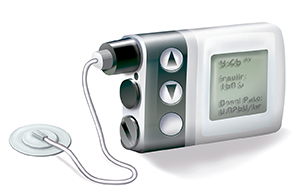Insulin Pump Use
Can anyone with diabetes use an insulin pump? Insulin pumps are used most often by
people with type 1 diabetes. But some people with type 2 diabetes also use them. Insulin
pumps can be used instead of giving insulin by injection. The FDA allows children
as young as age 2 to use certain insulin pumps.
These small devices clip to your clothing or attach directly to your body. The pump
delivers insulin through a tube (catheter) attached to your skin, often on the belly,
thigh, or buttock. It delivers a continuous (basal) dose of insulin 24 hours a day.
Before a meal, you push a button to give yourself a spike of insulin for food. Supplemental
or correction doses may be used to treat high glucose levels, if needed.

Pumps are useful for people who already take insulin but still don't have good glucose
control. Using a pump takes a lot of training. They are not for everyone. You must
work closely with a diabetes specialist, watch your blood glucose, count carbohydrates,
and keep food records. But it may be worth thinking about if you take insulin and
still have trouble with glucose control. And if you're committed to better diabetes
management. It may be expensive. But it is much more convenient for some people who
need 4 or more insulin injections daily.
New insulin pump models and similar systems are becoming available all the time. One
of these newer pump models may have a feature that is just right for you, such as
a lower basal insulin rate during exercise. Or a pump may be connected to a monitor
that also checks your blood sugar. It makes changes based on your blood sugar values.
Your diabetes educator may help you try several types until you find one that works
well for you.